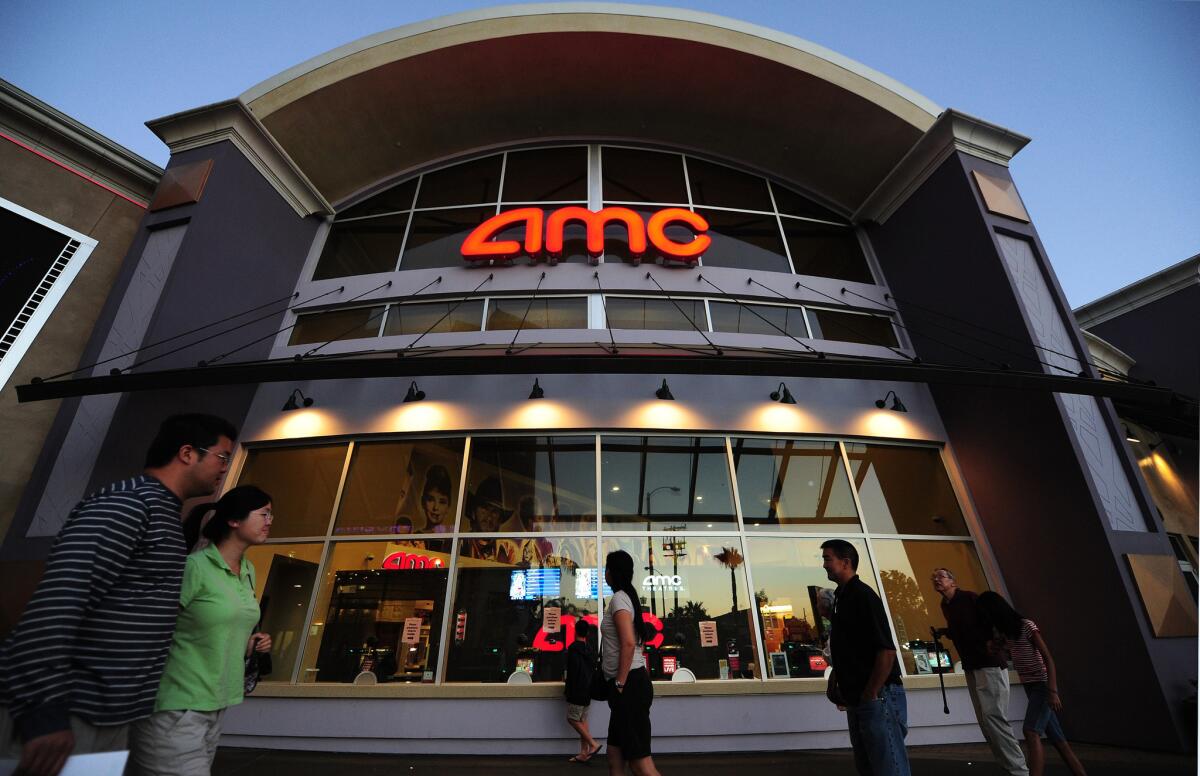Are ‘texting friendly’ auditoriums coming soon to AMC theaters?

There’s a lot of interest these days in whether millennials will be as interested in going to movie theaters as baby boomers have been, says Adam Aron, CEO of cinema giant AMC Entertainment.
Adam Aron was, until recently, running Starwood Hotels & Resorts. Just three months ago, he became CEO of cinema giant AMC Entertainment, catapulting him into one of the top positions in the movie business.
The Los Angeles Times spoke to Aron, 61, at the film industry conference CinemaCon at Caesars Palace in Las Vegas about various topics, including digital shifts in entertainment and how to bring millennials back to the theaters. He also weighed in on the touchiest subject of the week: Napster co-founder Sean Parker’s plan to offer movies on demand as soon as they hit theaters for $50 each.
You previously worked in the hotel business. What’s different about running a giant theater chain?
First some similarities. In my career, I’ve worked for airlines, hotels, cruise lines, ski resorts and sports teams — all in their own ways, fun and glamorous industries. That’s also what this business is. In all those industries there is some entertainment and hospitality aspect. AMC too is in the business of putting smiles on people’s faces.
Now some differences. This is the first industry in which I’ve worked where we’re not responsible for the entirety of the product. The movie theater business is a partnership between the movie makers and the movie exhibitors. We have to rely on Hollywood to do its bit and give us great product for our screens. We control a certain aspect of the product, which is how comfortable and how pleasing we can make the environment in which you watch that great movie.
Another difference is, apparently this is quite the fun and glamorous business, and once people get into it, they don’t tend to leave it. I think that makes people a little more used to the status quo, and that creates a lot of opportunity for AMC.
Is this industry doing enough to keep up with changing consumer habits?
There’s enormous opportunity there. AMC led the way a few years ago with much more comfortable seating and led the way in food and beverage . We’ve been leaders in sight and sound technology. There are more and more things we can do to please guests. Consumers really prefer the large screen if they can get to it, and we are going to dramatically increase the count of Dolby Cinema screens and Imax screens, and we’re going to create or own private label large screen in addition. There’s a lot of interest these days in whether millennials will be as interested in going to movie theaters as baby boomers have been. There are things we are going to have to think about. Before every movie we run a big thing that says, “Turn off your phone. Don’t ruin the movie.” To today’s 22-year-old, you know what they hear when we say that? “Cut off your left arm above the elbow. Don’t ruin the movie.” We’re going to figure out a way to change that. Maybe it’s special auditoriums that are texting friendly.
Is AMC participating in Sean Parker’s proposed home video start-up Screening Room?
I’ve made no public comment on the Screening Room, and I won’t today. But I can say that we see the yin and the yang of it. We’re very supportive of windows. That doesn’t mean you can’t experiment in how they’re managed, but they’re very important. We are willing to experiment with new ideas, and we understand the need for our studio partners to be profitable. So if there are ways for us to enhance studio profitability without hurting our profitability, we ought to be able to consider those things. The more profitable the moviemakers are, the more they’ll be able to turn around and make more movies for us.
Once you’ve swallowed Carmike and become the world’s largest cinema operator, how else do you see the company growing?
I think we’ll continue to grow through acquisitions, and I think we’ll continue building new cinemas. Even with the acquisition of Carmike, we’ll only have a 24% market share in the U.S. By other industry standards, that’s not a frighteningly large market share. There will still be opportunities to grow in the U.S. Of our 385 theaters, we have a whopping total of two outside the United States. It’s a big world. I could see us growing internationally as well.
What markets look interesting?
I’ll give you the Sarah Palin answer: Any and all of them. We’ll look where there’s opportunity, where we can have critical mass at an affordable price. I’d like us to be the biggest theater company in the world, and I’d like us to be the best movie theater chain in the world.
China’s foray into Hollywood is a big story. You’re owned by Dalian Wanda Group. How involved are they in the day-to-day?
Not at all. We’re running our own show. We report to our board of directors. Wanda has many seats on our board, and we keep them well informed, as well we should. In this case, the entity that owns 75% of our company is also in the movie theater business (in China). So when we talk to Wanda executives, we’re talking to experienced people in our industry, and we can share ideas about best practices.
More to Read
From the Oscars to the Emmys.
Get the Envelope newsletter for exclusive awards season coverage, behind-the-scenes stories from the Envelope podcast and columnist Glenn Whipp’s must-read analysis.
You may occasionally receive promotional content from the Los Angeles Times.







